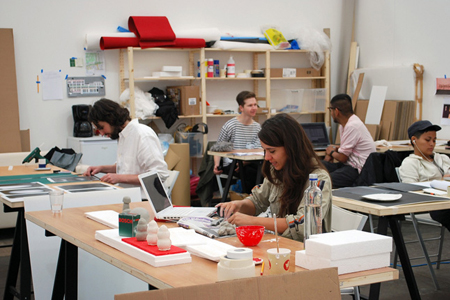  
|
Private Matters
organized by Ceren Erdem, Jaime Schwartz, and Lisa Williams
January 16 - March 1, 2014
An Unsolicited Proposal Program winning exhibition.
|

Stephanie Syjuco, COPYSTAND: An Autonomous Manufacturing Zone, 2009
|
|
Submitted Proposal:
In recent years, it has become increasingly apparent that the revelation of classified information and confidential documents is no longer the sole province of journalists or fodder for Hollywood films. Today, public access to what once was considered privileged information is a social reality, pointing to broader changes in the construction of our relationships and emphasizing the fact that - in our networked environment - virtually no information is private anymore. In the era of WikiLeaks, the codes are written to be broken and so are the rules. Private Matters will bring together a group of artists who, through individual strategies of sharing various kinds of secure information with the audience, blur the boundaries of the public and private. In this context, personal secrets are revealed, security measures of institutions are tested, and even the mysteries of outer space are made into common knowledge. These works share a reliance on technology, which has become an integral factor in the way that we interact with others in the information age; through various media, we share our statuses, moods, and follow each other in an endless voyeuristic cycle. By investigating these phenomena, the artists in this exhibition are able to effectively interrogate a range of personal and collective myths.
Artists will include Nilbar Gures (USA/Turkey), who in works such as Webcam Sex; Queer Solo (2012), looks at how information is shared on a very personal level and depicts seemingly bizarre scenes on fabric, the source imagery of which is derived from live webcam sex broadcast on the Internet; Maria Antelman's (USA) video work, Moonlight Serenade (2009), juxtaposes dreamy black-and-white images from the 1960s of the lunar surface with random shortwave radio transmissions thought to be the recordings of encrypted military espionage. The coupling of these expressive registers - a sense of hopeful possibility comingled with single-minded paranoia - implicates this specific moment in history; Pilvi Takala (Germany/Turkey) observes people's reactions in specific cultural situations or microcosms to critique the level of control - and the resultant paranoia - people have come to expect in society today. In her video, Broad Sense (2011), she sneaks into the European Parliament in Brussels, testing the security of governmental institutions; Becca Albee (USA) and Kathleen Hanna (USA) investigate physical and personal implications of the "private." Their installation In Case Of, New York City (2009), presents objects that women living in New York City identify when asked, "What do you carry that gives you a sense of security?" These everyday objects signify talismans adopted by individuals to ward off secret fears and threats; Stephanie Syjuco's (USA) work is strategized to both reveal and create mysteries for her audience. Phantoms (H_RT _F D_RKN_SS) (2011), comprises video, public domain texts, plants and tables, assembled in a matrix of clues that are offered to viewers to decrypt; and Jennifer Tee (the Netherlands) explores correlations between sculpture, space and mythology in Local Myths (2010).
|
|
|

